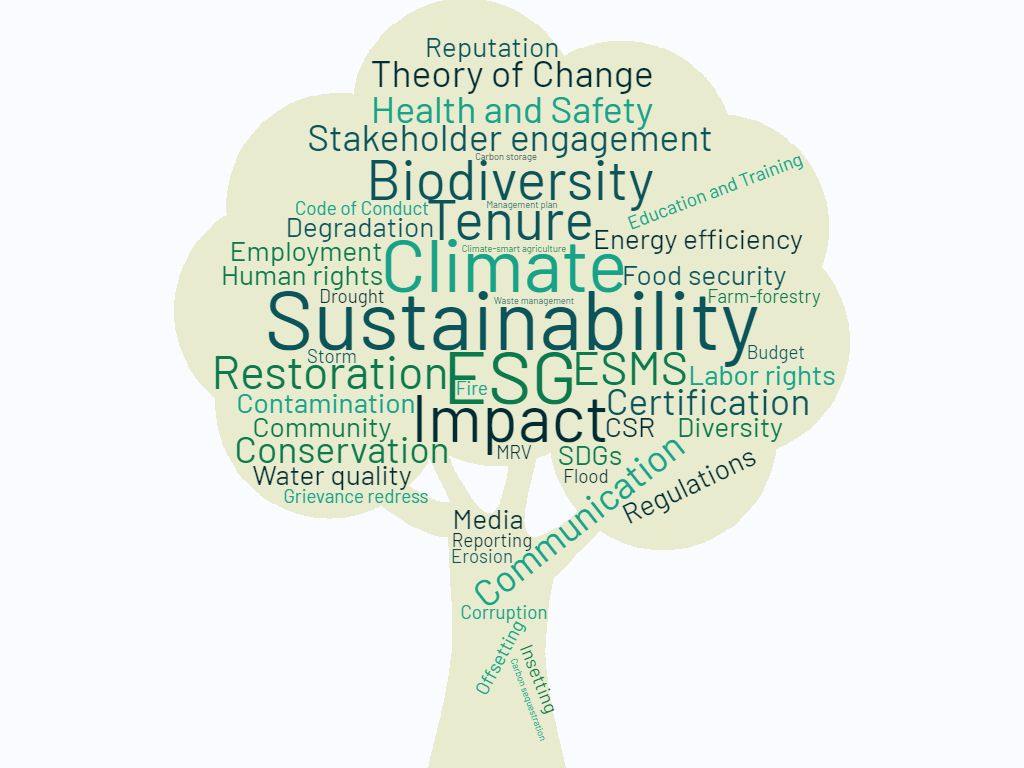
As a business owner operating in the space of responsible natural resource management in vulnerable tropical landscapes, sustainability is an obvious area of concern for you. You rely on the long-term supply of your product; whether that is wood for forest products, or agricultural crops for food supply – without this raw resource, you have no business. To this end, you must also consider the environmental footprint of your business; is your local operating environment at risk of contamination from agricultural run-off, or could the harvest of your product cause soil erosion? Operating in these geographies, you are also likely challenged with tenure security regarding the land on which your raw material grows, and even if you have legal rights over your land tenure, you still might face issues with informal encroachment. You may be concerned with availability of seasonal employees, and the adequate training, and health and safety of them. Ensuring your business is responsible also requires having a credible supply chain free from corruption and bribery. The list of sustainability issues you are faced with are numerous and attending to or failing to manage them could be responsible for the success or downfall of your business. However, often what is the case in businesses like yours is that your management and employee-base are so focused on day-to-day operations, that many sustainability issues fall through the cracks, posing huge risks and un-tapped opportunities for your business. Although economic viability of your business is a sustainability issue, I am omitting it from this discussion, because this is the going concern for management and operations, and thus does not need direct oversight from sustainability management.

Sustainability issues that need your attention
In the realm of sustainability issues, there are a plethora of terms and topics that come up, either in operations, by investors, your customers, or other stakeholders in your business – and you would be wise to address these at the management level of your business. This diagram provides a snapshot of these.
Understanding your immediate sustainability management needs
This list above is lengthy, and it is not exhaustive. It is overwhelming to consider the need to address all these issues, not to mention the ones I haven’t indicated, or those unique to your operations. Further, every business is at a different stage of growth, and subsequently will have varying resource availability to allocate to sustainability management. So, there are different ways in which this can be addressed. Initially, I would propose that your management team assess what issues require immediate attention. I believe this can be identified from looking to two key sources: Key stakeholder requirements, and critical ESG risks to your business.
- Key stakeholder requirements
- Regulatory requirements – laws dictating that you address certain issues; such as carrying out an environmental and social impact assessment in some jurisdictions.
- Investor requirements – mandatory sustainability conditions set by the investors in your business, such as having an ESG policy and procedures that align with their own.
- Critical ESG risks
- A thorough risk assessment, that includes Environmental, Social and Governance (ESG) issues will uncover the likelihood of a risk event occurring and the severity of the consequences if it does. If this assessment for example, uncovers that your operation is highly exposed to external land claims, and that the severity of such claims materializing would be catastrophic, this is a sustainability issue that needs immediate attention.
3 different ways to bring sustainability expertise into the management of your business
I would propose that there are three primary approaches to bring sustainability expertise into your business. Some stages of business might require all three, while others will manage well through utilizing one or two of the following approaches.
1. Delegate to existing management
If you are in the early stages of developing your business, you likely don’t have the resources to hire a Sustainability Manager, nor pay for an external expert. At this stage, delegating key sustainability issues to existing management can be highly effective; assuming there is commitment from said Manager. Due to the high importance of bringing investable natural climate solutions to the market, there are expert-created free resources emerging to support entrepreneurs in creating forest-linked businesses that can attract investors and reach scale. One such example is the work that FAO and other partners have done in creating a guide for developing bankable business plans to turn forest restoration into a sustainable business. You can watch this webinar that describes the upcoming guide that should be made publicly available within the next month. This would be a valuable tool to support you on identifying your immediate sustainability needs; in for example, identifying investor sustainability requirements and working through an ESG risk assessment.
If you utilize this approach, you must ensure that sustainability management is built in to your planning and operational management. Otherwise, you run the risk of addressing sustainability from a reactive position; where you might find yourself putting out fires (both figuratively and literally), rather than preventing them in the first place.
2. Outsource
Assuming your business is at a stage where you have the resources available to invest in sustainability management, there are a couple of scenarios where you could benefit from outsourcing.
The first is if you know you would like to hire a sustainability manager and/or build a team, but you are not yet sure of the precise expertise you need to hire in, and the scope of work this capacity would cover. Working with a sustainability expert can help you identify your sustainability management needs, budget, and to develop an action plan to build capacity, implement activities and monitor performance.
Secondly, you may already have a Sustainability Manager and/or team but have a specific, short-term, or 3rd party requirement to address a sustainability issue where niche expertise is required. In this case, outsourcing experts is an excellent option. This could look like, hiring in an expert to prepare your team and operations for forest management certification, or the carrying out of an independent biodiversity assessment. It could also be an engagement to oversee specific issues at certain times of the year, where that capacity is not needed year-round, for example with sustainability reporting and communication.
3. Hire-in
In the progression of your business’ development, you will ultimately want to get to the point where you can hire-in sustainability capacity. Depending on your business needs, this may be one person, or it may comprise an entire team of relevant experts. For example, you may have a Sustainability Manager that oversees the sustainability team, that could comprise a Health & Safety officer, a Sustainability Administrator, overseeing any relevant certifications, as well as ESG policies and procedures, and Impact management. You may have someone responsible for stakeholder engagement, who works with local authorities, communities, and manages communication. Perhaps an Environmental manager is part of your team, to ensure conservation values are protected, and that environmental safeguards, such as procedures for preventing contamination, erosion and fire are appropriately managed and mitigated.
In the short-term, building up your business’ sustainability capacity is critical for meeting legal and investor requirements, and minimizing risk. Over the long-term, quality sustainability management will enhance the profitability and resilience of your business and allow you to realize the positive co-benefits that can be achieved alongside commercial gains.
Learn more
If you would like to learn more about how developing the management of sustainability within your business can help you secure investment, reduce risk, and ultimately improve your profitability and impact, please contact me to learn how The ForestLink can support you.




